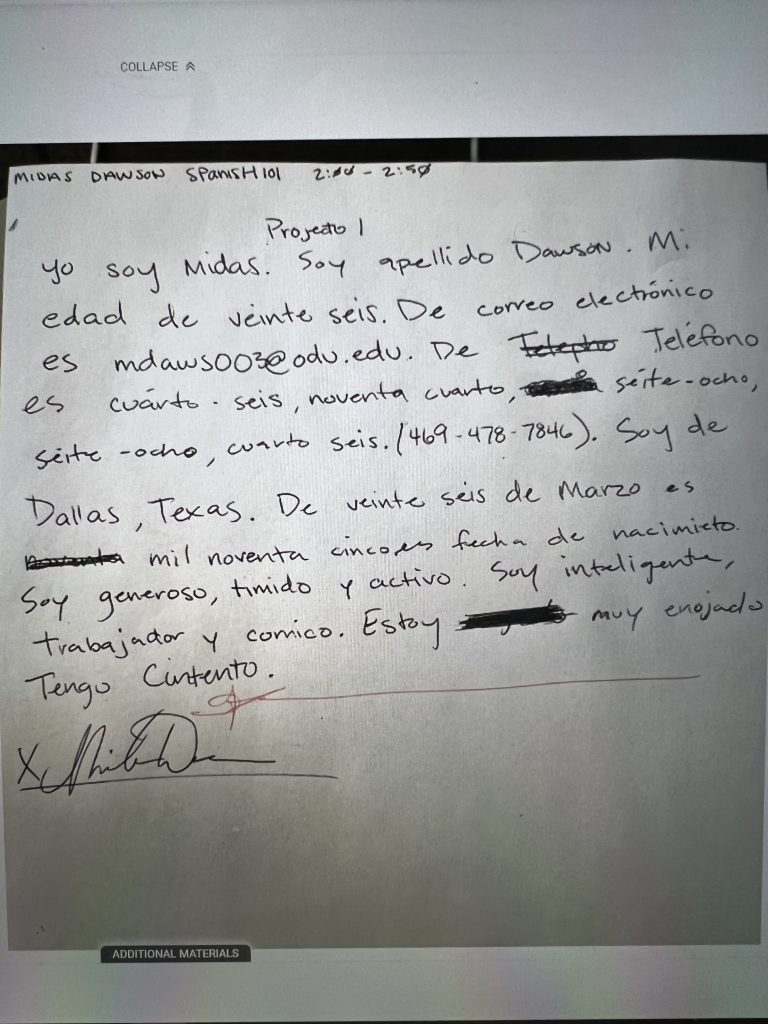Interpretive, Interpersonal, and Presentational Modes of Communication
Exploring culture
Going through the motions of not just talking in Spanish but also just having an open ear and catching important pieces of the conversation is what helped me with my practice. Everyone has a different way of getting the job done. For me, this was the best way I have grown to understand a lot more than I came in knowing on day one.
The Hispanic culture is no different from ours they have their own days for celebration, and they have their own ways of celebrating for example. The products I have gotten from my practice have helped me the whole way through Spanish this semester. My worldview has not changed much really, I’ve been around the world a couple of times, and I appreciate every culture I’ve come in contact with Hispanic culture is a culture I didn’t have to leave home to become a custom to. The challenges that came along were mostly with pronunciation and verbiage. As I said seeing the world from my perspective is different from that of the average college student and all misconceptions and stereotypes that we have seen through this course are just misconceptions and stereotypes.
Engaging in Communities
All communities immediate and global have an importance to uphold the people within and from all the research through Lingro learning I’ve seen that a lot of Spanish communities uphold each other and have more values through family, business, and even schooling.
Interpersonal Communication
One assignment I had this semester was to write out a problem/ solution paper that was discussed on a discussion board. It’s about male vs female nurses in today’s world and how male nurses are looked at as inferior to female nurses.
With all these assignments I have learned that a lot goes on within the world and we have only a corner of knowledge about what is going on. With all the tools are given to use searching for that knowledge should not be as hard. I overcame the difficulty by staying in the race for the long run when times get rough, and I didn’t think anything good would come I literally studied. Next, I know that it’s never enough studying you can always study more!
Presentational Speaking
I’ve done two oral presentations in Spanish and have grown to understand Spanish more than speak it which I’d call baby steps. Spanish isn’t too hard you just have to pay attention to detail. Some things don’t even change from English.
Presentational Writing
I’ve done at least four to five papers in English class but to compare them to Spanish would be a stretch. In Spanish class I’ve written projects “proyecto”. One thing they have in common though is Spanish has us learning in different places in the world. English class has me doing research in other places in the world.

Interpretive Listening
This is how a very good listening tool it helps with recognizing what the context of a sentence is even if you only understood a few words. Listening to a sentence or two and catching a couple of main words can give you the whole idea of what is being said.
I’ve grown to understand just a little more at a time but listening to the vocabulary over and over again helps as well. That is another activity I learned in Spanish. Repeating is key.

Interpretive Reading
With all the reading done in class, we have begun to comprehend more words phrases and even conversations between us are getting better. I feel as if the learning center for languages has helped us tremendously.
Challenging parts and unclear parts were just the memorization of the verbs and even some phrases at times. Practicing and repeating the verbiage was key and the only way to overcome the difficulty.